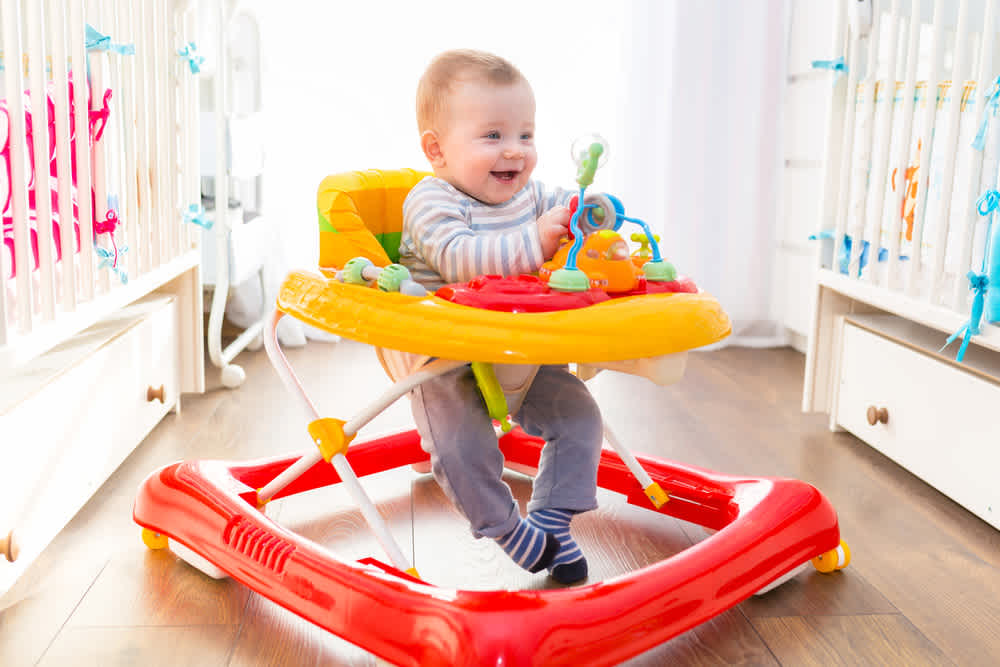
As a new mom, there are so many products on the market that claim to help your baby develop faster and better. One of these products is the baby walker. Baby walkers are designed to help your baby learn to walk by providing them with support and mobility. However, there is a lot of debate around whether or not baby walkers actually hinder development. In this article, we will explore the pros and cons of baby walkers and help you make an informed decision about whether or not to use one.
Table of Contents
What is a Baby Walker?
A baby walker is a device that is designed to help an infant move around before they are able to walk on their own. It consists of a seat that is suspended between wheels, and a tray that the baby can use to play with toys. Baby walkers are typically made from plastic and are adjustable in height to accommodate growing infants. They are designed for babies aged 4-16 months.
The Pros of Using a Baby Walker
There are several benefits to using a baby walker. First and foremost, they provide mobility for your baby. This can be a huge relief for parents who need to get things done around the house but can’t always hold their baby. Baby walkers also allow babies to explore their environment in a new way, which can promote curiosity and cognitive development. In addition, some parents find that using a baby walker helps their baby develop leg muscles and coordination.
The Cons of Using a Baby Walker
There are also several drawbacks to using a baby walker. The most significant of these is the risk of injury. Baby walkers can tip over, resulting in falls and head injuries. They can also allow babies to reach dangerous objects or areas, such as stairs or hot stoves. In addition, some studies have suggested that using a baby walker can delay the development of motor skills and cognitive abilities.
What do the Experts Say?
The American Academy of Pediatrics (AAP) recommends against the use of baby walkers. They cite the risk of injury as the primary reason for their stance. The AAP also notes that baby walkers do not help babies learn to walk and can actually hinder development. Other experts agree that baby walkers are not necessary and can be dangerous for infants.
Alternatives to Baby Walkers
If you are looking for alternatives to a baby walker, there are several options available. Consider using a stationary activity center, which provides many of the benefits of a baby walker without the risk of injury. You can also encourage your baby to crawl, which can help develop motor skills and cognitive abilities. Finally, be sure to provide plenty of supervised tummy time, which can help develop neck and back muscles.
Conclusion
In conclusion, baby walkers are a controversial product that come with both pros and cons. While they provide mobility and entertainment for babies, they also pose a risk of injury and may hinder development. If you do choose to use a baby walker, be sure to follow safety guidelines closely and supervise your baby at all times. However, there are many alternatives to baby walkers that can provide the same benefits without the risks. Ultimately, the decision of whether or not to use a baby walker is up to you and should be made based on your individual situation and beliefs.
Frequently Asked Questions
1. Are baby walkers safe for infants?
Baby walkers can be dangerous for infants due to the risk of injury. They can tip over, resulting in falls and head injuries. They can also allow babies to reach dangerous objects or areas, such as stairs or hot stoves.
2. Do baby walkers help babies learn to walk?
Contrary to popular belief, baby walkers do not help babies learn to walk. In fact, they can actually hinder development by delaying the development of motor skills and cognitive abilities.
3. What are some alternatives to baby walkers?
There are several alternatives to baby walkers, including stationary activity centers, encouraging crawling, and providing supervised tummy time.
4. At what age should a baby start using a walker?
Baby walkers are designed for babies aged 4-16 months. However, it is important to keep in mind that the American Academy of Pediatrics recommends against the use of baby walkers.
5. What are the risks of using a baby walker?
The primary risk of using a baby walker is injury due to falls or reaching dangerous objects or areas. Some studies have also suggested that using a baby walker can delay the development of motor skills and cognitive abilities.
